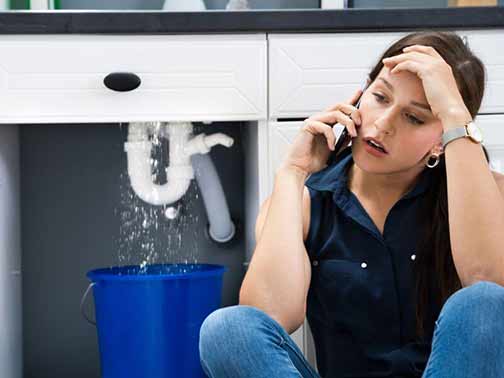
Plumbing problems – burst water pipes, slow drains, or other plumbing malfunctions – are typical in homes. But as Get Multifamily Property Management explains, plumbing problems are more challenging to deal with in an apartment building. The nature of apartment buildings makes it harder to pinpoint the cause of problems, and assigning responsibility for the issue is often problematic.
The fact that plumbing responsibilities are shared by all occupants/owners in the building often slows action. Also, since each apartment’s plumbing is connected to other apartments’ plumbing dealing with problems is never straightforward. But the tips below will help you avoid property damage and interpersonal conflicts when your apartment has plumbing issues.
Handling plumbing problems in an apartment
To avoid water damage and legal liability as a result of plumbing problems, it is essential that you do the following:
- Establish the extent of your personal responsibility for the plumbing.
- Identify the common plumbing issues that can happen in the apartment and know what to do about them.
Establish responsibility
Before moving into an apartment, have a sit-down with the managers to go through the rules and identify your role versus others’ roles regarding the plumbing. This step will help you avoid arguments and delays when solving plumbing issues. You can be more proactive with plumbing issues when you know what you should and shouldn’t do in your apartment.
Common apartment plumbing problems and what to do about them
-
Clogged toilets
This is a common and often distressing problem. If, after using the toilet, it won’t flush or flushes slowly and incompletely, you have a clogged toilet. A clogged toilet is caused by flushing the wrong items into the toilet. The short-term solution is to try removing the clog with a drain snake. The long-term solution is to not flush anything into the toilet except human waste and toilet paper.
-
Clogged drains
A clogged drain is like a clogged toilet, but the blockage is in a sink or shower drain this time. Again, the problem is caused by items that get washed into the drain, such as human hair, napkins, food particles, and even grease. You can protect the drain by installing strainers over the drain opening. But the best solution is to avoid the problem by not allowing the wrong items into the drain or having the apartment drains professionally hydro jetted.
-
Frozen pipes
If it gets freezing in your area during winter, the pipes in your apartment will tend to freeze. If water freezes inside a plumbing pipe, the resulting pressure can crack the pipe and cause it to burst. Water pipes should not be exposed to cold air from outside to prevent this. When this is impossible, the water inside those pipes should be completely drained.
-
Leakage
Leaks can happen almost anywhere in the home’s plumbing. The worst leaks are those where the leaking pipes are inside the walls and floors of the apartment. Common causes of plumbing leaks are old and worn-out pipes, rust and sedimentation inside pipes, or shoddy plumbing jobs. The best you can do to protect the apartment from plumbing leaks is to be aware of the telltale signs of a plumbing leak inside your home.
-
Dripping faucets
One dripping faucet can waste unbelievable water and inflate your apartment’s water bill. But this is actually a minor problem caused by worn-out components inside the faucet. Typically, the cause is an old or damaged O-ring, which can be replaced in a few minutes for only a few dollars. This is a problem you can solve yourself.
-
Contaminated water
Dirty or smelly water from your pipes is a sign of contamination. This can happen due to rust and corrosion inside the pipes, or it could be that soil is getting into the water through a broken underground sewer pipe. If this problem is happening with all the faucets in the home, the root of the issue is probably outside your apartment. You need to get a plumber to look at the plumbing.
-
Low water pressure
Clogged aerators inside your faucets often cause low water pressure. If only one or two faucets in the home have this problem, this is the most likely cause. Cleaning the aerators inside the faucets will solve the problem. Other causes of low water pressure are blocked or leaky pipes. Or the issue could also be from the municipal supply.
As a final point, a communal mindset is important for people who live in apartment buildings. It is important to identify all the parties who play a role in the health of your apartment’s plumbing and build a relationship with them. This kind of collective approach to solving plumbing issues is the way to facilitate fast action when there are problems.
That being said, a professional plumber who is always within reach and understands the workings of the building’s plumbing system is also vital. A competent plumber nearby can save you money and help you avoid potential legal liabilities from a plumbing issue in your apartment.

